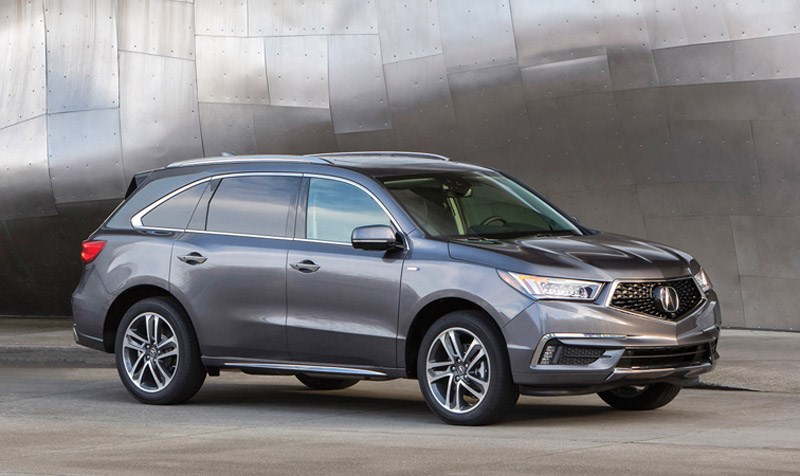As applied to numerous automobiles, the “Sport” term is one of the most misused appellations around.
But those audacious folks at Honda’s premium brand have incorporated the Sport label to the new hybrid version of the seven-passenger MDX. In this case, it’s tough to argue the point.
The MDX Sport Hybrid moves the yardstick well past the point of most buyer expectations in the larger-wagon group. And that includes design, performance, fuel efficiency, spaciousness and comfort.
The Sport Hybrid offshoot gets its mojo from the same powertrain first found in the RLX hybrid sedan and later adapted for the second-generation NSX sports car.
For the MDX, it consists of a 3.0-litre V-6 gasoline engine that by itself makes 257 horsepower and 218 foot-pounds of torque. Directly assisting the V-6 is a 47-horsepower electric motor built into the Sport Hybrid’s seven-speed paddle-shift transmission with automatic mode.
In back are twin electric motors that contribute 36 h.p. to each rear wheel. Combined, the drive system puts out 321 h.p. and 289 foot-pounds of torque. That compares to 290 h.p. and 267 foot-pounds for the non-hybrid MDX with its 3.5-litre V-6 and nine-speed automatic.
If it seems like the hybrid should have higher net numbers, it’s because the electric motors mostly assist at engine revs well below the gasoline engine’s peak power. Despite weighing an extra 105 kilograms, the Sport Hybrid launches and accelerates with authority and functions so smoothly delivering power to all four wheels that drivers won’t notice anything unusual going on.
Acura says that the rearward electric motors alone initially help launch the MDX from a dead stop before the gasoline engine kicks in, but that transition is mainly unnoticed.
Also unnoticed is any intrusion into the cabin by the hybrid’s hardware. The lithium-ion battery pack is located beneath the second-row seat, while the Power Control Unit (PCU) and Intelligent Power Unit (IPU) that control the system’s operation are positioned under the front seats. As a result, the Sport Hybrid has identical passenger space and cargo volume to the gasoline MDX.
What will get your attention, though, is the fuel-consumption rating of 9.1 (litres/100 kilometres) in the city, 9.0 on the highway and 9.0 combined. The best you’re likely to see from the non-hybrid MDX is 12.6/9.0/11.0.
Your best shot at duplicating the Sport Hybrid’s numbers is to leave the driver-adjustable four-mode drive system in Normal or Comfort (reduced steering effort and softer suspension settings). But for more spirited driving, the Sport mode firms up the suspension and adds more feedback to the electronic power-assisted steering.
Sport+ alters the transmission’s shift points, disables the electric-only function and delivers maximum rear electric power when you step on the accelerator.
When turning, one of the rear electric motors applies additional torque to the outside wheel while the other motor adds light braking to the inside wheel. This torque-vectoring effect helps the MDX corner more precisely.
Pricing starts at $72,000 (including destination charges), which is about $16,000 more than a base non-hybrid MDX. This includes the usual amenities plus leather-covered seats, navigation, ELS-brand premium audio system and a full suite of active-safety technology.
The Sport Hybrid Package also adds premium heated and ventilated leather-covered front seats, heated second-row bench, upgraded wood-trimmed interior accents, heated steering wheel, second-row sunshades and a surround-view system with seven cameras that provide a 360-degree look at your surroundings.
Note that the second-row captain’s chairs available in the gas-only MDX aren’t offered on the Sport Hybrid. A seven-passenger utility vehicle that’s thrifty on fuel and actually sporty to drive is an impressive accomplishment. Unless you’re prepared to dig deep for a Porsche Cayenne, Mercedes-Benz GLS or Audi Q7, the MDX Sport Hybrid is a significant bargain.
Market position
Creating a hybrid system that improves performance and fuel efficiency means the best of both worlds and makes the driving experience more pleasurable.
Points
Hybrid system is a seamless performer. Torque-vectoring system inspires confidence on winding roads. Interior accommodations are first rate. Adaptive suspension soaks up the rough spots. Zero hybrid-hardware intrusion means there’s plenty of room for passengers and their gear. The Sport Hybrid is definitely worth the added cost over comparably equipped non-hybrid MDX models.
Active safety
Blind-spot warning with cross-traffic alert; active cruise control; emergency braking; lane-keeping assist.
Competition
Infiniti QX60 Hybrid: Stylish wagon uses a supercharged I-4 with an electric motor for 250 net h.p. Base price: $60,400.
BMW X5 xDrive40e: Pricey plug-in hybrid can run for less than 20 miles on battery power alone. Base price: $77,800.
Lexus RX 450h: Five-passenger luxury hybrid makes a respectable 308 combined horsepower. Base price: $72,500.



